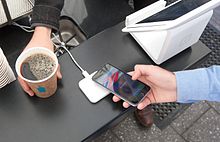
| Futures studies |
|---|
| Concepts |
| Techniques |
| Technology assessment and forecasting |
| Related topics |
In a cashless society, financial transactions are not conducted with physical banknotes or coins, but instead with digital information (usually an electronic representation of money).[1][2] Cashless societies have existed from the time when human society came into existence, based on barter and other methods of exchange, and cashless transactions have also become possible in modern times using credit cards, debit cards, mobile payments, and digital currencies such as bitcoin.
Such a concept has been discussed widely, particularly because the world is experiencing a rapid and increasing use of digital methods of recording, managing, and exchanging money in commerce, investment and daily life in many parts of the world, and transactions which would historically have been undertaken with cash are often now undertaken electronically.[3][4] Some countries now set limits on transactions and transaction values for which non-electronic payment may be legally used.[5]
- ^ "The Cost of Cash in the United States" (PDF). The Fletcher School Tufts University. p. 9. Archived from the original (PDF) on 1 December 2016. Retrieved 17 December 2016.
- ^ Kitamura, Yukinobu (2022). "A Cashless Society: Facts and Issues". Quest for Good Money. Hitotsubashi University IER Economic Research Series. Vol. 48. pp. 125–139. doi:10.1007/978-981-19-5591-4_7. ISBN 978-981-19-5590-7.
{{cite book}}:|journal=ignored (help) - ^ Cite error: The named reference
guardianwas invoked but never defined (see the help page). - ^ Sheffield, Hazel (21 May 2015). "The UK is getting closer to becoming a completely cashless society". The Independent.
- ^ "Cashless-Society.org". Cashless-Society.org. Archived from the original on 14 December 2017. Retrieved 27 January 2017.